By Jim Davis - Florida Catholic
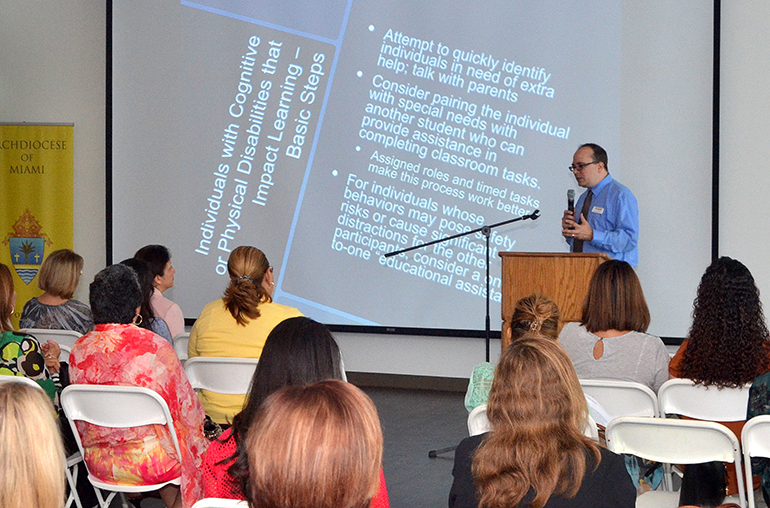
Photographer: JIM DAVIS | FC
Joseph White of Our Sunday Visitor gives the keynote speech at the Rel Ed Expo.
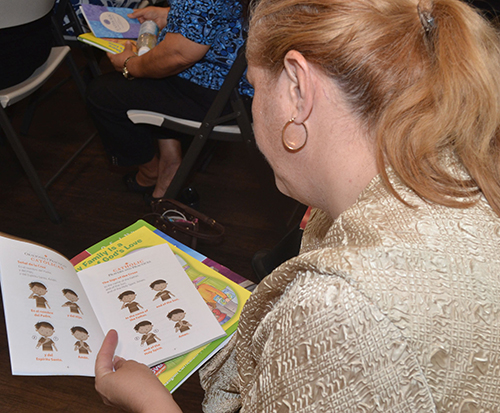
Photographer: JIM DAVIS | FC
Laura Lantigua, of Mother of Christ Church in Miami, looks at a booklet on how to teach a child the sign of the cross.
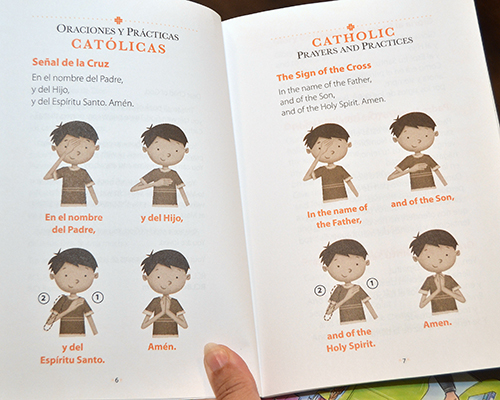
Photographer: JIM DAVIS | FC
Booklet at the Rel Ed Expo shows how to teach a child the sign of the cross.
DORAL | Who gets more out of serving the disabled?
The answer is less obvious than it may seem. More than one parishioner told The Florida Catholic that they, not their clients, benefited most.
"Over all these years, I've gotten so much out of it," said Sue McCrea, director of religious education at St. Bonaventure in Davie, which has been serving disabled people for 16 years. "I get joy and peace, watching the children come so far."
That theme of spiritual rewards was reinforced by the keynote speaker at the first-ever archdiocesan RelEd Expo on serving the disabled.
"I think that a lot of times, we don’t recognize the gifts of people with special needs, and that's a pity," said Joseph White, national catechetical consultant for the Huntington, Ind.-based Our Sunday Visitor, a major Catholic publisher. "Whatever we do to those in need, we do it to Jesus. So we may be giving to them, but they're giving us a greater gift: an encounter with Christ."
OSV was one of three publishing firms that offered talks, tips and materials at the June 28 expo. About 60 people from 30 parishes attended the event at Our Lady of Guadalupe Church, Doral. Even one of the invited publishers voiced surprise on the emphasis on the disabled.
"It's the first one for us," said Brian Murphy of the century-old Sadlier company.
The archdiocesan Office of Catechesis holds an annual conference on religious instruction — the 37th annual Catechetical Conference drew 1,000 to St. Thomas Aquinas High School in Fort Lauderdale — but this was the first South Florida Catholic event that focused on teaching people with special needs.
How many need help?
Although a handful of South Florida parishes have pioneered in serving the disabled — as have institutions such as the Marian Center School in Miami Gardens and the Schott Communities in Cooper City — the initiative is so new, even the archdiocese doesn't know the size of the need.
Nationally, one of every 60 people has an impairment of sight or hearing, or a condition like autism or Down syndrome, said Peter J. Ductram, director of the catechetical office. In local terms, he said, it means that every parish in the archdiocese has an average of 15 people with special needs.
"We can only show catechetical leaders the different tools available, and provide opportunities for conversation," Ductram said. Hence this first-ever expo.
Ductram also showed examples in a video at the event. "Made in God’s Image: Catechesis with Children with Special Needs" gave a peek at three parishes that have pioneered in serving the disabled: St. Bonaventure in Davie, Our Lady of the Lakes in Miami Lakes and Mother of Our Redeemer in Miami.
In the six-minute video, one woman says that seeing a child taking Communion was "the most marvelous day that I have had … I don’t think anyone noticed that Luke is a child with special needs."
Says another church worker: "It's a two-way street of love and affection. It's not just what I'm doing for them … a lot of times, it's more what they're doing for me."
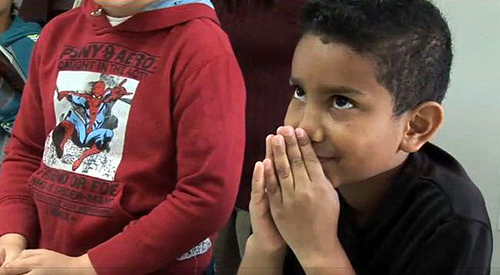
Photographer: JIM DAVIS | FC
Scene from "Made in God’s Image: Catechesis with Children with Special Needs," a six-minute video from the archdiocesan Office of Catechesis.
The video has since been posted on miamicatechesis.org.
Walking through a parable
The expo then broke up into small sessions with each of the three publishers.
Our Sunday Visitor presented a curriculum for preschool and kindergarten children with developmental issues, with a flexible approach including magnetic figures and a song for each lesson. Another program can be adapted for issues like dyslexia, dysgraphia (a handicap in writing) and intellectual disabilities.
RCL Benziger of Cincinnati showed a booklet with a chart of gestures for explaining how to make the sign of the cross. A speaker also suggested helping a child learn the parable of the Good Shepherd while walking around a nativity scene.
Sadlier, of New York, showed lessons in physical books, e-books and video DVDs. The company even offered a free music download called "Lead Us to the Water."
Also at the expo were Elisa Guerra and Dan Gonzalez of Mass Explained, a South Florida-based company that sells books, cards, coloring books, mobile apps, posters, even Catholic-themed pins and T-shirts. Some of the materials work with special-needs children who learn better by sound or touch, Gonzalez said.
Laura Lantigua of Mother of Christ Church in Miami, praised the event for the many resources it offered.
"It really helps those who are just starting a program," said Lantigua, coordinator of religious education at the church. "Many parishes are afraid to start."
The United States Conference of Catholic Bishops has long recognized the need for such outreaches. In 1978, the bishops called for "broader integration of persons with disabilities into the full life of the Church." But it wasn't until 1995 that they issued guidelines for helping the disabled celebrate the sacraments.
The 10-page study, made available online as well at the RelExpo, stresses that all baptized Catholics are "equal in dignity in the sight of God"; as such, they have a right to take part in the sacraments as do other members of the church. The guidelines suggest ways to make all seven sacraments available to the disabled.
What matters most
Despite all the tools and techniques at the RelEd Expo, presenters and attendees alike said the disabled don’t need detailed, abstract facts before they can receive confirmation or Communion.
One essential, said White of Our Sunday Visitor, is making sure a child can tell the consecrated host from ordinary bread. Some disciplines, like learning prayers, aren’t vital, he said.
"Confirmation doesn't mean you’ve become an adult," he said. "It means the completion of baptism. I think a person in a state of innocence has graces that the rest of us don’t."
Attendees like St. Bonaventure's McCrea agreed that simple personal qualities — like patience and persistence — were most important for ministering to the disabled.
The Davie parish serves 48 people with various disabilities, including autism, Down syndrome and other learning disabilities. Even surrounding parishes send their special-needs members to St. Bonaventure, she said.
She and others started simple: "You look at the child, talk to them, figure out where they're at. Materials help, but what matters is in here," she said, pointing to her heart.
And the rewards are great, she added: "Like seeing parents crying when their child has first Communion, when they never thought that day would come."
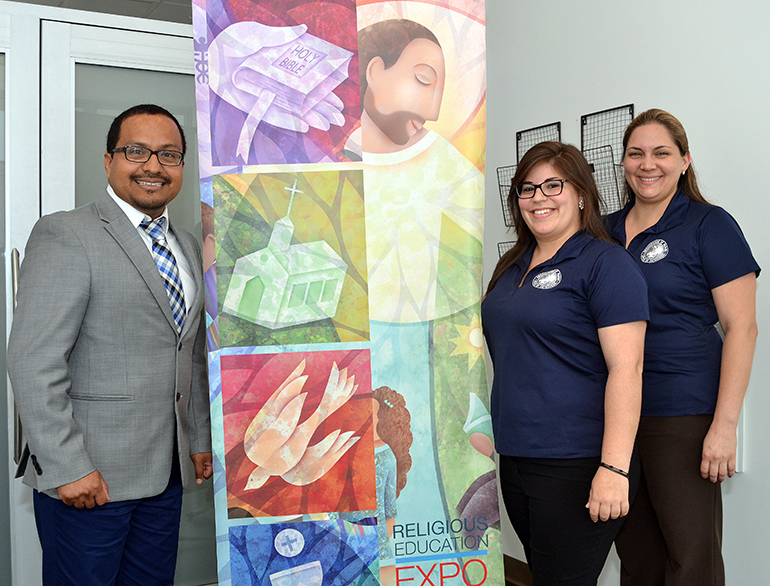
Photographer: JIM DAVIS | FC
Peter J. Ductram, director of catechesis for the archdiocese, shows the banner of the recent Religious Education Expo. On the right are his staffers: administrative assistant Yomaira Diaz (next to the banner) and Teresita Prieto, coordinator of formation and certification.
This is part of a package of stories on Church outreach to the disabled that appeared in the July 2016 edition of the Florida Catholic. See related stories:
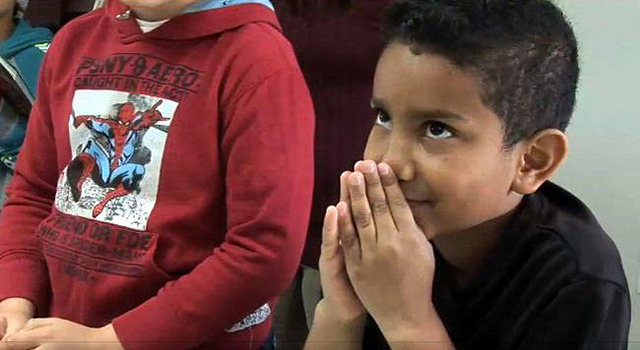

Comments from readers